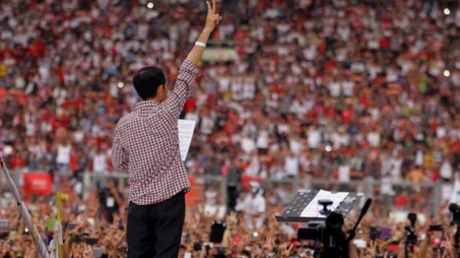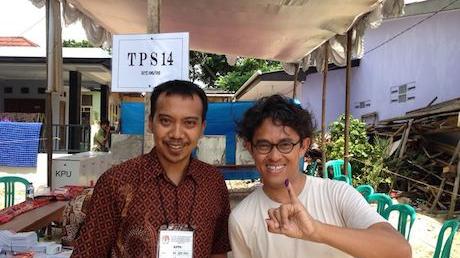
Much of the discussion of Indonesia's 9 April election has focused on interpreting the surprising results for key parties. The Indonesian Democratic Struggle Party (PDI-P) did less well than predicted, Islamic parties performed better, and the National Democratic party made a strong debut as a new political actor.
But for mine, the biggest surprise was the voter turnout. Various quick counts estimated voter turnout at 72-75 per cent, reversing the trend of steadily declining participation since Indonesia's first post-authoritarian election in 1999.
In part, this decline reflects falling public faith in politics, and apathy towards the prospect of political and economic change after elections. But there are also administrative and technical reasons: an inaccurate electoral role, the absence of a mechanism for absentee voting, and the difficulty of choosing one candidate among the hundreds presented to voters under the proportional system.

Voter Participation in Indonesian elections Source: KPU and Indikator Politik Indonesia*
What accounts for this surprising voter turnout in this year's election? Could it have been the unusually large campaign this year urging voters not to 'golput' - a term that originally meant punching the white paper between party symbols as a protest vote in authoritarian elections, but now just means not casting a vote.
This year's anti-golput campaign went beyond just the government and the electoral commission. Political parties and civil society organisations also tackled the issue, urging people to vote. Various campaigns enlisted posters, flyers, media advertisements and discussions. Senior police and electoral officials even claimed that inviting other people not to vote was a crime under the electoral law, although the basis for their claims seems tenuous.
Some opponents of golput say the practice harms the quality of representative democracy. If not everyone takes the opportunity to choose their leaders, then it is questionable whether democracy is functioning to articulate the will of the people.
The anti-golput campaign also involved a religious element. The Council of Islamic Scholars (MUI) issued a fatwa declaring golput to be haram (sinful) prior to the 2009 election, a notion that was again publicised prior to this year's poll. Indonesia’s two largest Islamic organisations, Nahdlatul Ulama and Muhammadiyah, also appealed for people not to golput. These appeals appeared to be an effort to counter campaigns calling for Indonesians to abandon democracy by Islamist organisations such as Hizbut Tahrir Indonesia, who only agree with elections conducted under the laws of an Islamic state.
But why is golput such a focus in Indonesia, when the decline in voter turnout at elections is a global phenomenon? One of the reasons often advanced to oppose golput is that low voter turnout reduces the government's legitimacy. This reason does not stand up to scrutiny. Parliamentarians and the president have full legislative and executive authority regardless of voter turnout. Moreover, many elections for local heads of government in Indonesia have seen voter turnout figures in the 60 per cent neighbourhood, without anyone suggesting governors and district heads are less legitimate as a result.
Similarly, some opponents of golput say the practice harms the quality of representative democracy. If not everyone takes the opportunity to choose their leaders, then it is questionable whether democracy is functioning to articulate the will of the people. Again this rationale is open to criticism. If we conceptualise voting as a right rather than a responsibility, then golput is one way for citizens to express their dissatisfaction with the government and politicians. In fact, this is precisely the case made by the sprinkling of activists who called for citizens not to vote in this year's election.
There has also been a financial element to the criticism of golput. Elections in Indonesia are expensive - the government has allocated Rp 14.4 trillion for the 2014 election cost, whereas in 2009 the cost was Rp 9.4 trillion. Logistics, including the printing of enough ballot forms for everyone, is the largest component of this budget, at around 60 per cent. Large piles of left over ballot forms when people do not show up to vote are a waste of state resources.
Golput isn't an issue in all democracies. In Australia for example, where voting is compulsory, it is considered a responsibility as well as a right. People who don't vote incur a fine, although in practice citizens can avoid this penalty by supplying any plausible reason to explain not being able to vote. Nor is Australia unique - Indonesia's regional neighbours Singapore and Thailand have also made voting compulsory, as do a sprinkling of countries in Europe, Central and South America and Africa.
Compulsory voting is out of the question in Indonesia though - the Constitutional Court rejected a case calling for this outcome in March this year. The applicant, Taufiq Hasan, called for compulsory voting on the grounds that the elucidation of Indonesia's constitution describes the people as having "sovereignty, responsibility, the right and the obligation to democratically elect a leader".
He complained that many of the problems of democracy in Indonesia stemmed from citizens not voting, and argued that voting was a much less onerous responsibility than paying tax or defending the country. The court ruled though that voting was a right of all citizens, who thus had the freedom either to exercise or not to exercise their right.
Even if it were possible, legislative change to make voting compulsory seems unnecessary. Indonesia is not facing a crisis of voter turnout. Making voting compulsory would also recall Indonesia's recent authoritarian past, in which voting was effectively compulsory for civil servants, and local leaders such as village chiefs were expected to mobilise citizens to vote. It was this situation that gave rise to golput in its original form - spoiling the ballot form as an anonymous protest vote.
In any case, those dissatisfied with voter turnout may be better to focus on the reasons people are not voting, rather than seeking to make voting obligatory.
Such a focus would give democracy activists, political parties and civil society serious work to do to increase the quality of representation and promote ethical politics.




